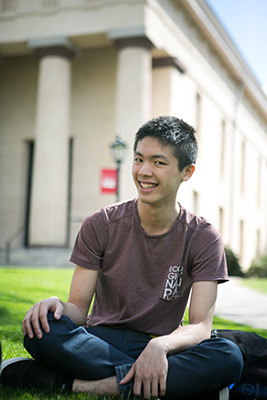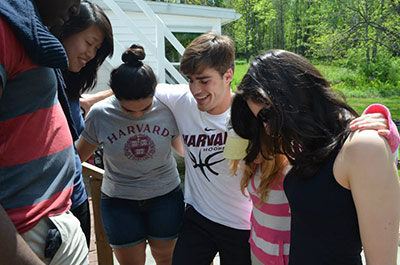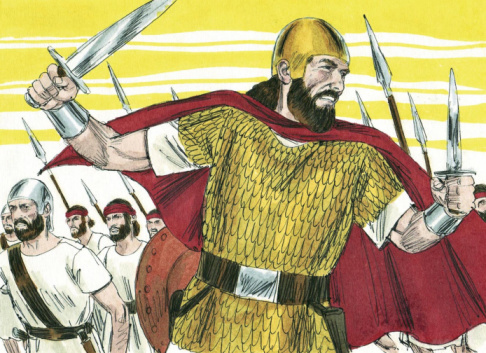All
"You are the light of the world. A city set on a hill cannot be hidden. Nor do people light a lamp and put it under a basket, but on a stand, and it gives light to all in the house. In the same way, let your light shine before others, so that they may see your good works and give glory to your Father who is in heaven." — Matthew 5:14-16
Effective Prayer
By Qwynn Gross
From YouTube

What can we do to ensure that our prayers are effective? Christian Union Ministry Fellow at Princeton Qwynn Gross uses the Bible to show that by praying God's will, our prayers will always be heard...
Watch Now >
I believe that Christians should seek to influence civil government according to God's moral standards and God's purposes for government as revealed in the Bible (when rightly understood). But while Christians exercise this influence, they must simultaneously insist on protecting freedom of religion for all citizens, a right that is rightfully embedded in our First Amendment.
Three Historical Developments Explain How We Got Here
by Ryan T. AndersonIn recent political memory, religious liberty was a value that brought together conservatives, libertarians, and progressives. As recently as 1993, the federal Religious Freedom Restoration Act was passed by a nearly unanimous Congress and signed by a Democratic president. Today, the same value is a political liability. Bakers, photographers, and florists are being ruined, adoption agencies shuttered, and schools threatened with loss of accreditation and nonprofit status. So what happened? Why is religious liberty now losing so much ground?
As I explain in my just-released book, Truth Overruled: The Future of Marriage and Religious Freedom, three historical developments explain our current predicament: a change in the scope of our government, a change in our sexual values, and a change in our political leaders' vision of religious liberty. An adequate response will need to address each of these changes.
Gains New Editor-in-Chief
 In the fall semester, Brown sophomore Nicholas Chuan will take over as editor-in-chief of The Cornerstone Magazine, a student-run, Christian literary and arts magazine. According to the Singapore native, the Bible teaching and leadership development provided by Christian Union's ministry on campus has helped shape his worldview and equip him for his new leadership role.
In the fall semester, Brown sophomore Nicholas Chuan will take over as editor-in-chief of The Cornerstone Magazine, a student-run, Christian literary and arts magazine. According to the Singapore native, the Bible teaching and leadership development provided by Christian Union's ministry on campus has helped shape his worldview and equip him for his new leadership role."The in-depth and rational look Christian Union takes toward various issues, such as sex and spirituality, has given me a model to think about issues within the Christian worldview," said Chuan. "Christian Union Bible courses have given me a deeper understanding of the Gospel and how to live it out as a student."
Christian Union Hosts Senior Sendoff
 As the class of 2015 prepared to graduate, Don Weiss, Christian Union's ministry director at Harvard College, emphasized the need for seniors to keep Christ as their foundation in their new ventures.
As the class of 2015 prepared to graduate, Don Weiss, Christian Union's ministry director at Harvard College, emphasized the need for seniors to keep Christ as their foundation in their new ventures."There's nothing that compares to being able to say 'It is well with my soul,'" Weiss told students during the ministry's gathering to honor seniors on May 1. "Your house is going to stand with Jesus underneath."
Christian Union at Dartmouth Hosts Art Showcase
Christian Union's ministry at Dartmouth sponsored an eclectic art showcase on campus this spring.Students expressed their talents through a variety of forms, including visual arts, rap, and dance. With each brush stroke, dance step, and beatbox rhythm, God's creativity was expressed as the students shared their gifts.
"I believe that God is an artist," said Ian Chaffin '15.
Longtime Friends, Colonial Figures Agreed to Disagree
by Catherine ElvyAn 18th-century evangelist whose legendary oratory skills helped ignite the Great Awakening across two continents also played a role in the creation of the University of Pennsylvania.
George Whitefield, one of the most touted spiritual figures of the U.S. colonial period, preached to as many as 10 million spectators across North America and the British Isles, according to Christianity Today.
Along the way, Whitefield enlisted Benjamin Franklin as his printer and publicist in the colonies in the early 1740s. Collaboration between the longtime pals helped birth a forerunner to Penn a decade later, though the pair differed on the role of faith in early American higher education.
For great is the Lord, and greatly to be praised;
He is to be feared above all gods.
For all the gods of the peoples are worthless idols,
but the Lord made the heavens.
Splendor and majesty are before Him;
strength and beauty are in His sanctuary.
— Psalm 96:4-6
Has Science Buried God?
By John Lennox
From RZIM

In a lecture at Rice University last week, renowned Professor of Mathematics John Lennox, from the University of Oxford, tackled the question, "Has Science Buried God?" Professor Lennox is a tremendous communicator and thinker in the area of faith and science...
View Now >
A Prayer and Fasting Devotional
 And Samuel said, “Has the LORD as great delight in burnt offerings and sacrifices, as in obeying the voice of the LORD? Behold, to obey is better than sacrifice, and to listen than the fat of rams. - 1 Samuel 15:22 (ESV)
And Samuel said, “Has the LORD as great delight in burnt offerings and sacrifices, as in obeying the voice of the LORD? Behold, to obey is better than sacrifice, and to listen than the fat of rams. - 1 Samuel 15:22 (ESV)Obedience is important to God.
Perhaps that sounds to you like the understatement of the century. You may be saying to yourself, “Of course obedience is important to God…what a remarkably unimpressive way to start to a devotional!” And that may be a fair summation of your perspective on the Christian life. However, I’d like to suggest that the importance God gives to our obedience is an often-underemphasized reality in substantial portions of the American church.





